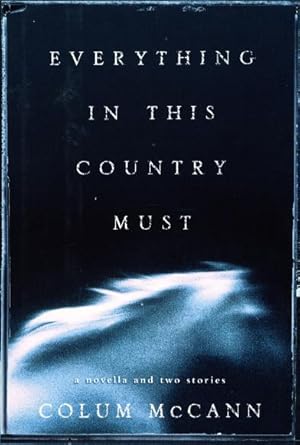In a fourth volume of short fiction, the author of This Side of Brightness and Songdogs captures the tragic implications of political upheaval and tragedy on the lives of individuals trapped amidst the internecine conflicts of Northern Ireland.
Colum McCann uses the point of view of an innocent to superb effect in his new novella and two stories,
Everything in this Country Must. The title is taken from the first story, in which Katie, a 15-year-old girl, strives to help her father save a drowning horse. She fears that the horse will die, "since everything in this country must."
Although Katie's voice is a little too cute at times, McCann really finds his stride in the novella, "Hunger Strike", told from the perspective of a 13-year-old boy, whose uncle is on hunger strike in Long Kesh. In the confused and conflicted boy, McCann succeeds in expressing the inability of most people to comprehend the experience of watching someone starve themselves to death. Staying with his mother in a caravan in Galway, the boy envies his uncle and misses the North. All the incipient signs of becoming "a hard man" are there: half a letter self-tattooed on his finger; throwing stones at sheep; spitting at cars; and shouting "tough shite" at any opportunity. The boy tears out his uncle's picture from a newspaper and folds it into his pocket, saying, "He could stay alive in there and emerge when all of this was over." He also begins to refuse to eat and moulds bits of food into small chess pieces, something he can easily control. The text is interrupted by charts showing the mounting days, dropping weights and blood pressure of the prisoners. The relationship between the mother and son is exceptionally well-drawn--the moments she doesn't scold him for swearing and the moments he notices her let slip the word "wee" and they share pride in their Northern-ness. The boy's puberty is visually exact as when he parades himself with "his shirt ambitiously undone" when his first chest hair appears. As the uncle's death approaches, the boy's incapacity for tenderness and emotional release finds outlet in a final destructive act which McCann balances very convincingly.
This highly accomplished new work has benefitted from gestation at a distance and shows how the Troubles will linger in writer's minds long after a lasting peace. --Cherry Smyth
![]()
